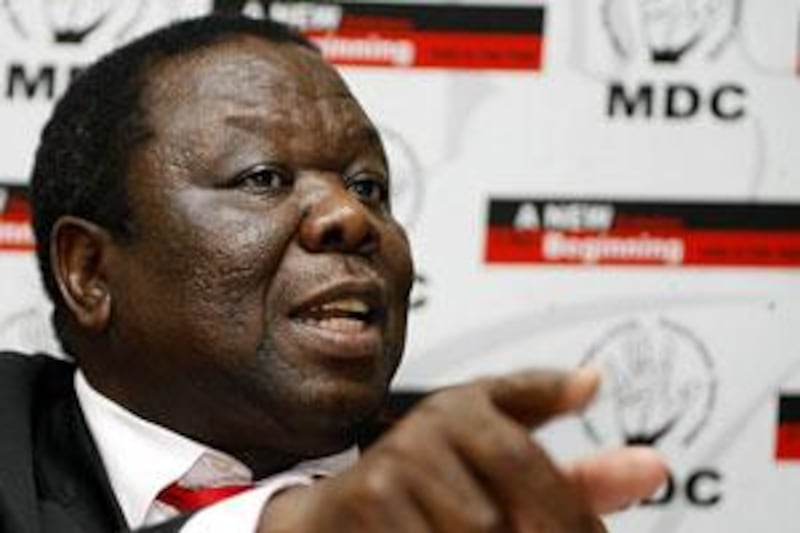BULAWAYO // Zimbabwe has entered an era of hope after the main opposition party, the Movement for Democratic Change, made a historic decision to join a unity government under the leadership of Robert Mugabe's Zanu-PF party. The keenly awaited decision, made by the MDC's national council at a meeting in Harare on Friday, ended seven months of inter-party talks between the country's three major political parties. They signed a power-sharing deal in September, but disagreements over the sharing of ministerial portfolios, provincial governorships, diplomatic posts and senior civil service positions frustrated progress towards the formation of the unity government.
The breakthrough came on Monday when a summit of leaders of the Southern African Development Community (SADC) recommended setting up a coalition government involving Zanu-PF and both factions of the divided MDC by Feb 13. However, Morgan Tsvangirai, the leader of the MDC, had to secure the formal backing of his party, having agreed in principle to the SADC recommendation. At the summit, held in South Africa, the SADC leaders drew up a timeline within which the three parties must conclude work ahead of the Feb 13 swearing-in of the Mr Tsvangirai as prime minister and Arthur Mutambara, president of the MDC-M faction, as his deputy. Ministers and their deputies will be sworn in two days earlier.
John Makumbe, a political-science professor, welcomed the MDC's decision. "It is time to move on for the sake of the nation. "It was important for them to take the risk to join the unity government. The future looks brighter economically if the parties co-operate." Mr Makumbe said the MDC enters the inclusive administration as a junior partner to Zanu-PF, as Mr Mugabe still wields a lot of executive power.
"The MDC might actually fail to make an impact in terms of governance and find itself in an awkward position of being in government but not governing. The only way that can be relevant is to keep pressing for more equitable power-sharing," he said. Zanu-PF will hold 15 ministries in the unity government, among them defence, agriculture, local government, and information and publicity. Mr Tsvangirai's party will have 13 and Mr Mutambara's three.
Mr Tsvangirai has complained that Zanu-PF will hold most key ministries, one of the reasons why his party previously rejected to implement the September deal. However, Mr Makumbe said the MDC had little room to manoeuvre this time around because of SADC pressure on the party and Mr Tsvangirai's recent visit to the cholera-hit Budiriro suburb in Harare where he sampled the seriousness of the humanitarian crisis Zimbabweans believe is being made worse by the political stalemate.
"All eyes were on Tsvangirai and his party. They showed they uphold the interests of the suffering masses despite the fact that the party is not entirely happy with some aspects of the power-sharing deal. I can now wake up every day with hope for a better future," said Adam Mwale, a pensioner. Mr Mwale, who said his pension had been eroded to become worthless and no longer bothers to draw it, said he believes the political settlement could ease his burdensome life.
Inflation was 230 million per cent in July, but is now thought to be in the quadrillions. More than seven million people need food aid, unemployment is above 80 per cent, and the cholera epidemic has killed more than 3,000 of the 60,000 people afflicted. Announcing the resolution, Mr Tsvangirai said his party had taken into account the devastating effect of the economic crisis on the people. He added that Mr Mugabe had also made some concessions that provide some basis for co-operation.
"Therefore," said Mr Tsvangirai in a statement, "in accordance with the party's constitution, the political agreement we signed on Sept 15 2008, and in the best interests of the welfare of all Zimbabweans the MDC has resolved to form an inclusive government with Zanu PF and MDC-M. "Now is the time for us to put aside our political differences, to prioritise the welfare of the people in both our policies and our actions and to focus on stabilisation, development, progress and democratisation. In this I know that we have the support of the vast majority of Zimbabweans, both in Zanu PF and the MDC, in the civil service, the workers and the business community and we look forward to working with you to rebuild our great nation."
Reketayi Semwayo, the chairman of Zanu-Ndonga, an opposition party, warned that without honesty and mutual respect the proposed government could fail. "Having said that, we thank SADC, which through its facilitator, [Thabo Mbeki, the former South African president] got us here. We expect the unity government to firstly stabilise the economy, secondly to put it on a recovery path and lastly to promote reconciliation and national healing."
@Email:tmpofu@thenational.ae





